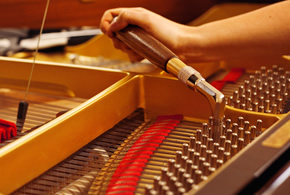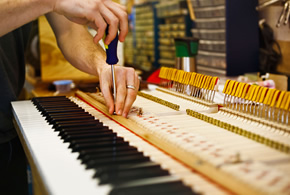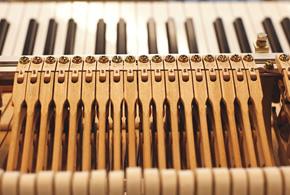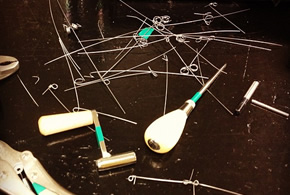Piano Tuning
|
Pianos typically require tuning at least twice a year due to seasonal changes in humidity. This is true for pianos of all ages, brands and whether they are played or not.
In Southern Ontario, your piano is weeks away from needing a tuning when you turn on the heat in the winter and turn it off in the spring. This is because the humidity changes cause the swelling or shrinking of the wooden structure of the piano and ultimately drifts out of tune. If you play the piano frequently, you may want to have your piano tuned more often. This is because the louder and more frequent you play a piano, the faster it goes out of tune. The force of piano hammers repeatedly striking the strings affect the equalization of tension along the string's length, and cause its pitch to be slightly altered. For example: A concert piano is tuned before every performance while a professional studio piano is tuned multiple times weekly when in constant use. |
Regulation
|
The playing mechanism of the piano, called the "action", is a complex and finely tuned machine. As with any other machine, regular maintenance is required to keep the piano feeling and working the way it was designed. Each key on a piano has many parts, when properly adjusted work together to strike the strings and produce the sound you hear when you play just one note.
These parts are subject to wear and tear over the years of playing as well as changes in the wooden parts due to humidity. Keeping your piano properly regulated will keep the correct relationship between parts, prevent unnecessary wear and make your piano action feel the way it is supposed to. Common Issues:
|
VoicingVoicing affects the tonal quality of the piano sound. This is the final step taken when preparing a piano. Once a piano is properly tuned and regulated, the hammers on the piano can be voiced to ones preference. While some people prefer pianos to have a soft, mellow sound, others prefer a bright sound. This is largely subjective and is often carried out on newer pianos to meet a customers preference.
Piano hammers have a wooden core, wrapped in a dense felt. By adjusting the resilience of the felt, pianos can be voiced to have different tonal characteristics best suited for you. |
Repairs
|
Minor repairs may be performed quickly during a piano tuning for a fee depending on the situation. Often small problems than can be addressed within minutes during a scheduled tuning can be free.
Broken treble strings are relatively inexpensive to replace while bass strings however are wrapped in copper and are custom made. When booking a tuning to mention any other problems with the piano so that I can schedule adequate time to address all of your concerns. |




